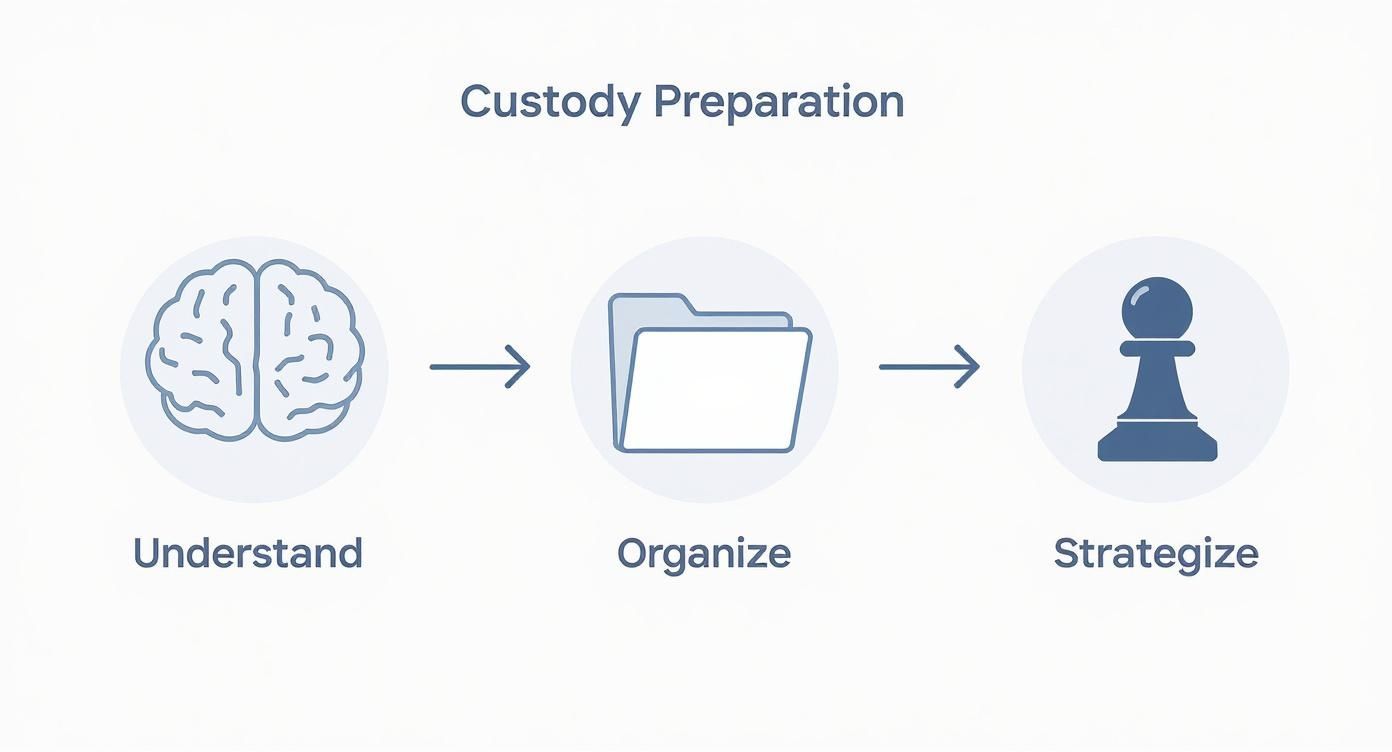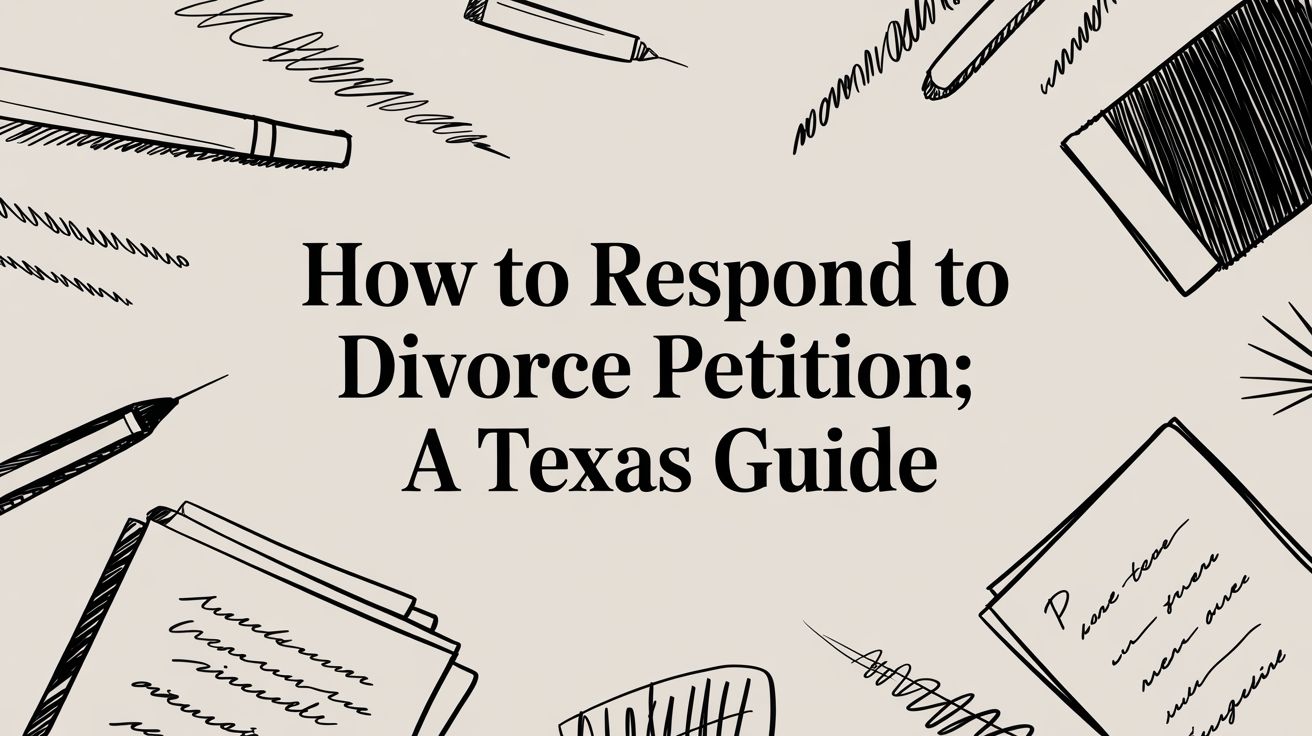Standing on the brink of a custody hearing is one of the most nerve-wracking moments you can face as a parent. But you can turn that uncertainty into confidence. The key is preparation, and it all starts with a single-minded focus: showing the court that you provide a stable, loving, and supportive home for your child.
This guide is designed to pull back the curtain on the process, giving you clear, actionable steps to prepare for your day in a Texas family court.
Understanding the Foundation of Your Custody Case
Every decision a Texas family court judge makes comes down to one guiding principle: the “best interest of the child.” This isn't just legal jargon; it's the lens through which every piece of evidence and every word of testimony is viewed.
Your job isn't to win arguments or score points against the other parent. It's to tell a clear, honest story—backed by facts—that shows how your care serves your child’s emotional and physical well-being. Your preparation is all about building a case that proves your stability, your deep involvement, and your fitness as a parent.
The Goal is Often Agreement, Not a Courtroom Battle
It’s easy to imagine a tense courtroom showdown, but the reality is that the vast majority—around 90%—of child custody cases in the U.S. are settled through an agreement before ever seeing a trial. You can find more details on these statistics at LegalJobs.io.
While only a small fraction of cases are ultimately decided by a judge after a full-blown hearing, being fully prepared for court is what gives you leverage in those settlement talks. This prep work often starts long before you ever see a judge, beginning with knowing how to file for custody in Texas.
What does this mean for you? It means that every document you gather and every piece of evidence you organize is critical, whether you end up in mediation or in front of a judge.
What Does "Best Interest" Mean in Texas?
To determine what’s best for a child, the Texas Family Code gives judges a list of factors to consider. These are often called the "Holley Factors," and your preparation should be built around proving your strengths in these key areas:
- Emotional and Physical Needs: Can you prove you meet your child's daily needs for safety, food, shelter, and emotional support?
- Parental Abilities: How can you demonstrate your skills, stability, and responsible nature as a parent?
- Stability of the Home: What evidence shows you provide a consistent and safe home environment?
- Child’s Wishes: For children 12 and older, the judge might consider their preference, but it's never the only factor.
Your entire strategy should be built around these factors. Every document you collect and every point you plan to make should answer one simple question: "How does this prove I am acting in my child's best interest?"
Building Your Case With Documents and Evidence
When you step into a custody hearing, a judge's decision will hinge on facts and credible evidence, not just emotional appeals. Your job is to translate your day-to-day life as a parent into a clear, documented story that proves your stability and commitment to your child. The process of gathering evidence can feel overwhelming, but think of it as systematically collecting the pieces that show the judge you're the safe, reliable choice.
This isn't about digging up dirt on the other parent; it’s about showcasing your strengths. Every document you gather should serve a single purpose: to demonstrate that you consistently act in your child’s best interest, as defined by the Texas Family Code. Your evidence is what gives your testimony its power.
Organizing Your Essential Documents
Think of yourself as the project manager for your case. Start by creating organized files—whether you prefer physical folders or digital ones—for different categories of evidence. This simple step will not only make a great impression in court but will also give you a sense of control and confidence during a very stressful time.
Get started by gathering these key items:
- Financial Stability Records: Pull together recent pay stubs, bank statements, tax returns, and proof of timely bill payments. These documents show the judge you have the financial means to provide a stable home and cover essentials like housing, food, and healthcare.
- Child's School and Medical Records: Collect report cards, attendance records, emails with teachers, and notes from doctor or dentist visits. This paper trail proves your active involvement in your child's education and health—two things judges care about deeply.
- A Detailed Parenting Calendar: Keep a simple calendar tracking your possession schedule. Note every time you have your child, every overnight, and any time the other parent was late, missed a visit, or asked you to take extra time. This log can become a powerful exhibit to shut down false claims about your involvement.
Below is a quick overview of the three core phases you'll go through when preparing your evidence for a custody hearing.

As you can see, solid preparation moves from understanding the legal standard ("best interest of the child") to organizing your proof, and finally, to planning how you’ll present it effectively in court.
Handling Communications and Digital Evidence
In today's world, texts, emails, and social media posts often end up as key pieces of evidence. A seemingly harmless message can easily be twisted out of context, so it's absolutely critical to manage these communications with care.
Never send a text or email to the other parent that you wouldn't want a judge to read out loud in court. Keep your communication brief, business-like, and focused solely on the child.
If the other parent sends you hostile, threatening, or inappropriate messages, do not delete them. Instead, take clear screenshots and save them in an organized folder. This documentation can help establish a pattern of behavior that may be very relevant to the case. And it goes without saying: be mindful of your own social media. Photos from late-night parties or angry rants can easily be used against you.
In some situations, hostile communications are part of a larger pattern of misconduct. If you believe this is happening, it's important to understand how to prove parental alienation.
To give you a better idea of what to collect, here is a checklist of the types of evidence that are often crucial in a Texas custody case.
Essential Custody Hearing Evidence Checklist
| Evidence Category | Specific Examples | Why It's Important |
|---|---|---|
| Financial Stability | Pay stubs, tax returns, bank statements, proof of rent/mortgage payments. | Shows your ability to provide a stable and secure home environment. |
| Child's Wellbeing | School records, report cards, medical/dental records, teacher communications. | Demonstrates your active involvement in the child’s education and health. |
| Parenting Time Log | A detailed calendar of visitation, noting missed/late exchanges or extra time. | Provides a factual record of possession schedules and counters false claims. |
| Communication Records | Texts, emails, co-parenting app messages (OurFamilyWizard, AppClose). | Establishes the nature of co-parenting communication—positive or negative. |
| Home Environment | Photos/videos of the child's room, living space, and neighborhood. | Gives the judge a visual of the safe and nurturing home you provide. |
| Character References | Written statements or testimony from teachers, neighbors, or family friends. | Offers third-party validation of your parenting skills and character. |
| Proof of Misconduct | Police reports, CPS records, screenshots of threatening messages, or social media posts. | Documents any behavior by the other parent that endangers the child. |
Having these documents organized and ready will put you in a much stronger position when your hearing date arrives.
Preparing for a custody hearing is an emotionally and financially demanding process. You have to present clear evidence of your relationship with your child and your ability to provide a stable home. The complexity of family law is reflected in the sheer volume of cases—the U.S. sees over 380,000 paternity cases and 330,000 child abuse and neglect cases filed annually. You can find more data on these legal matters from the Hague Conference on Private International Law.
By carefully gathering and organizing your documents, you build a foundation of facts that supports your story and helps the judge see the truth about your commitment to your child. This methodical approach is your best tool for navigating the hearing with strength and clarity.
Understanding the Courtroom and Key Players
Walking into a Texas family courtroom for the first time can feel like stepping onto a stage where you don't know the script. It’s intimidating. But knowing who’s in the room and what role they play can instantly lower your anxiety and help you focus on what really matters—your child.
This isn't about legal drama; it's about understanding a structured process designed to make a critical decision for your family's future.
Think of the courtroom as a professional meeting space where every person has a specific job. Once you understand their roles, you can navigate the hearing with more confidence. This knowledge empowers you to participate effectively rather than feeling like a spectator in your own life.
The People You Will See in the Courtroom
While your attorney will be your primary guide, you’ll be in a room with several other key figures. Knowing who they are and what they do will demystify the entire experience.
- The Judge: This is the ultimate decision-maker. The judge’s job is to be an impartial referee, listen to the evidence from both sides, apply the law—specifically the "best interest of the child" standard from the Texas Family Code—and make a ruling. Always address the judge as "Your Honor."
- The Bailiff: The bailiff is a law enforcement officer in charge of courtroom security and order. They are the ones who call the court to session, swear in witnesses, and make sure the proceedings run smoothly and safely.
- The Court Reporter: This person's job is to create an official, word-for-word transcript of everything said during the hearing. They are the official record-keepers, which is why it's so important to speak clearly and never talk over anyone else.
- An Amicus Attorney or Ad Litem: In some highly contested cases, the judge may appoint a neutral attorney to represent the best interests of your child. This lawyer, known as an Amicus Attorney or Attorney Ad Litem, doesn't work for you or the other parent. Their job is to investigate the situation—interviewing you, your child (if they're old enough), teachers, and others—and then make a recommendation to the court.
The Typical Flow of a Custody Hearing
While every hearing has its own unique twists and turns, most follow a predictable pattern. Having a mental roadmap of the process can help you stay grounded and prepared for what’s next.
First, the attorneys will make brief opening statements. This is where your lawyer introduces your case to the judge and outlines what you're asking for and why. Think of it as a preview of the story you're about to tell through your evidence and testimony.
Next comes the presentation of evidence. The parent who filed the motion (the Petitioner) typically goes first, calling their witnesses and submitting documents. Your attorney will then get a chance to cross-examine their witnesses. After they're done, it's your turn to present your case as the Respondent in the same way. This is where all the documents you've gathered and the testimony you've prepared come into play.
Finally, the hearing wraps up with closing arguments. Here, your attorney will summarize the key evidence and make a final, persuasive argument to the judge about why your requests are truly in your child's best interest.
Hearings can be intensely emotional, but the procedure itself is very structured. The judge is focused on facts and evidence, not on who tells the most dramatic story. Your calm and organized presentation will speak volumes.
Temporary Orders vs. Final Trial: What’s the Difference?
It's critical to understand that not all hearings are created equal. You'll likely encounter different types as your case moves forward.
A temporary orders hearing usually happens early in a case. Its purpose is to establish rules for custody, visitation, and support while the divorce or custody suit is ongoing. These orders are a temporary solution designed to maintain stability for your child until a final decision is made.
A final trial, on the other hand, is the main event. This is where the judge makes a final, binding decision on custody that becomes part of your permanent court order. The evidence required and the level of preparation for a final trial are far more extensive than for a temporary hearing.
Before you even get to a final trial, most Texas counties will require you and the other parent to attend mediation. This is a confidential process where a neutral third-party mediator helps you try to reach an agreement on your own terms. A successful mediation can save you the time, expense, and emotional toll of a trial, putting the final decisions back in your hands instead of a judge's.
Mastering Your Testimony and Courtroom Conduct
In a Texas family court, what you bring in your binder is only half the battle. How you present yourself can be just as impactful as the evidence you've gathered. The judge is watching everything—not just what you say, but how you say it and how you carry yourself from the moment you walk in.
This is your guide to making sure your demeanor, testimony, and courtroom conduct all tell the same story: that you're a credible, responsible parent focused on your child's well-being.

Presenting Yourself With Confidence and Respect
First impressions in a courtroom are critical, and they start before you ever say a word. Your goal is to project an image of a stable, serious parent who respects the process.
Treat your court appearance like an important job interview. Business casual is the standard. This isn't about wearing expensive clothes; it’s about showing the court you understand the gravity of the situation. Clean, conservative attire helps the judge focus on your testimony, not your outfit.
Beyond what you wear, your actions speak volumes.
- Show Up Early: Punctuality shows you're organized and respect everyone's time. Simple as that.
- Be Polite to Everyone: This means the bailiff, the court reporter, the opposing attorney, and yes, even the other parent. Judges notice professionalism and appreciate it.
- Address the Judge Correctly: It's always "Your Honor." Stand when the judge enters or leaves, and stand when you're speaking to them.
These small gestures of respect add up, painting a picture of you as a calm and reasonable person.
Delivering Clear and Credible Testimony
When it’s your turn to testify, the goal is to be clear, honest, and direct. This is your chance to tell your side, but it's done by answering questions—first from your attorney, then from the other side.
The single most important rule? Always tell the truth. Even a tiny white lie or exaggeration can completely torpedo your credibility if it's found out. If you don't know the answer to something, saying "I don't know" or "I don't recall" is perfectly fine. In fact, it's the right thing to do.
Listen to the entire question before you even think about answering. Take a breath, collect your thoughts, and give a concise, direct answer. Fight the urge to ramble or volunteer extra information, especially when being questioned by the other attorney.
The judge wants to hear about your child and your parenting. They don't want to hear a list of your personal grievances with the other parent. Frame your answers around your child’s best interests, not on trying to "win" a fight.
Staying Composed During Cross-Examination
Cross-examination is often the most dreaded part of any hearing. The other parent's attorney will be questioning you, and their job is to poke holes in your story and test your testimony. They might ask leading questions or try to get a rise out of you.
Your job is to stay calm. Period.
No matter how provocative a question feels, do not get into an argument with the lawyer. Look at the attorney as they ask the question, but then turn and direct your answer to the judge. This simple act shows you're there to communicate with the decision-maker, not to get into a verbal sparring match.
If a question is confusing, it's okay to ask for it to be rephrased. If you feel your emotions starting to bubble up, take a slow, deep breath before you speak. Your composure under fire demonstrates maturity and emotional stability—two qualities every judge looks for in a parent. Remember, from start to finish, you are showing the judge exactly what kind of parent you are. A calm, honest, and respectful presentation is your most powerful tool.
Navigating Custody Evaluations and Social Studies
The idea of a total stranger evaluating your parenting can feel invasive and frankly, a bit unsettling. When parents just can't agree on what’s best for their child, a Texas judge might order a child custody evaluation or a social study to bring in an impartial, expert opinion.
This isn’t about digging up your past mistakes. It's about giving the court a detailed, neutral snapshot of your child’s world and needs. The evaluator’s only goal is to make a recommendation based on the "best interest of the child" standard from the Texas Family Code. Their final report carries a lot of weight with the judge, so your complete and honest cooperation is essential.

What to Expect During the Evaluation Process
This process is thorough. Be ready for in-depth interviews with the evaluator, both by yourself and with your child. These conversations are designed to get a feel for your parenting style, the bond you have with your child, and your perspective on the custody dispute.
You can also count on home visits. The evaluator needs to see the environment where your child lives. The whole process can take several months, and it usually includes a few key components:
- Individual Interviews: One-on-one meetings with each parent to discuss history, parenting, and concerns.
- Parent-Child Observation: The evaluator will want to see how you and your child interact naturally.
- Home Visits: A walkthrough of each parent’s home to check for safety and suitability. Is it a child-friendly space?
- Collateral Interviews: The evaluator will likely talk to other important people in your child's life—think teachers, doctors, or counselors.
- Psychological Testing: In certain situations, the court may order assessments to screen for any issues that could affect your parenting ability.
How to Present Yourself Authentically and Positively
Your goal here isn't to put on a show. Don't try to be the "perfect" parent—evaluators are trained professionals, and they can spot a performance a mile away.
Instead, just focus on being honest and prepared. Clean your house as you would for any important guest. Make sure it's safe, child-friendly, and stocked with food.
During interviews, be open and cooperative. Be ready to clearly and calmly talk about your strengths as a parent. Give them concrete examples. Instead of just saying, "I'm a great dad," try something like, "I make it a point to read with my daughter every night, and I've built a strong relationship with her teacher so I always know how she's doing in school."
The evaluator is a neutral party, not your enemy. Treat them with respect, answer questions truthfully, and keep the conversation focused on your child's needs and how you meet them. Your consistency and cooperation will say more than any perfect performance ever could.
Sometimes, a judge might have specific concerns about a parent's mental health. It’s crucial to understand how parent psychological evaluations impact custody decisions in Texas and what that process involves.
Since the emotional well-being of your children is a central part of any custody evaluation, you may find helpful information in a parent's guide to counseling for kids. Going over all of this with your attorney beforehand will give you the confidence you need to get through the process effectively.
Final Preparations and What to Do Next
The nervous feeling you get as the hearing date gets closer is completely normal. All the work you’ve put in—gathering documents, thinking through your testimony, and working with your attorney—has all been leading up to this moment.
Every single step you’ve taken has been a powerful act of love for your child. Now, it's time to channel that energy into one last, focused push. This isn’t about cramming at the last minute. It's about bringing everything together so you can walk into that courtroom with the quiet confidence that comes from knowing you’re ready.
The Week Before Your Hearing
The final days are all about refining, reviewing, and keeping your head straight. This is not the time to introduce new evidence or make major changes to your strategy. Instead, your energy should be spent mastering the case you've already built.
This is when you should sit down with your attorney for a final strategy session. Go over the key pieces of evidence one last time and run through your testimony. You need to be crystal clear on the main points your lawyer will be making and exactly how your testimony supports the bigger picture of your child’s best interest.
This week, your job is to:
- Touch base with all your witnesses. Confirm they're ready and know exactly when and where they need to be.
- Double-check your evidence binder. You and your attorney should be able to flip to any document in a matter of seconds.
- Review potential cross-examination questions. Practice giving calm, direct, and honest answers.
- Handle the logistics. Plan what you'll wear to court, arrange for childcare, and confirm you have the time off work.
Staying Focused on What Matters Most
On the day of the hearing itself, your main goal is to stay calm and present. The judge needs to see a stable, responsible parent—not someone consumed by anger or anxiety. Lean on your preparation and trust your attorney to guide you through the day.
You’ve done the heavy lifting already. You found the proof of your involvement in your child's life and organized your story in a way that makes sense. Now, all that's left is to present that truth with integrity, always keeping your child at the heart of every answer you give.
You are your child’s number one advocate. All this preparation has given you the tools to tell your story and tell it well. Walk into that courtroom knowing you have done everything in your power to fight for a stable, loving future for your child.
What to Do Next
With your hearing just around the corner, having an experienced legal guide in your corner is more crucial than ever. If you're wrestling with last-minute questions or need the steady hand of a compassionate family law attorney who knows the Texas court system inside and out, we are here to help.
The Law Office of Bryan Fagan, PLLC, is dedicated to helping parents like you protect what matters most. We invite you to schedule a free, no-obligation consultation to discuss your case and make sure you feel completely prepared for your day in court.
Frequently Asked Questions About Texas Custody Hearings
It’s completely normal to feel a mix of nerves and resolve as your court date gets closer. To help you feel more prepared, we’ve put together some straightforward answers to the questions we hear most often from parents heading into a Texas custody hearing.
How Long Does a Typical Custody Hearing Last in Texas?
There’s no one-size-fits-all answer here, because the length of your hearing really depends on what it’s for.
A temporary orders hearing, which is designed to put some ground rules in place for custody and support while the case is moving forward, can be relatively quick. Think anywhere from a few hours to maybe a full day. The goal is to bring some immediate stability to your child's life without getting bogged down in every single detail just yet.
On the other hand, a final trial is a much bigger deal and can easily stretch over several days. The final timeline hinges on how complex your situation is, how much evidence needs to be presented, and how many witnesses are called to testify. This is where having a sharp attorney becomes critical—they know how to present your case efficiently and make the most of the court’s limited time.
Can I Use Text Messages as Evidence in My Hearing?
Absolutely. Text messages, emails, and social media posts can be some of the most compelling evidence you have. They often give the judge a raw, unfiltered glimpse into communication styles, parenting decisions, and behaviors that might not come across in formal testimony.
But you can’t just walk in and hand the judge your phone. For digital evidence to be admissible, it has to follow the Texas Rules of Evidence. This usually means printing everything out in a clear, organized format that shows who sent it, when it was sent, and the full context of the conversation.
Work with your attorney to pinpoint the specific messages that actually prove your point. A single, well-chosen text that undermines the other parent's claim can be far more powerful than a hundred angry messages presented without context.
What Happens If the Other Parent Lies in Court?
It’s a tough reality, but under the pressure of a custody hearing, some people will bend the truth or tell outright lies on the stand. If this happens, your most important job is to stay completely calm.
Seriously. Don't gasp, shout, or make a scene. Any kind of outburst will only make you look bad and damage your credibility with the judge.
This is what your attorney is for. Let them handle it. They will use cross-examination to poke holes in the false testimony, using the very evidence you’ve worked so hard to gather—your documents, emails, and witness statements—to expose the lie. Your composure, combined with your lawyer’s skilled questioning, is the one-two punch that effectively deals with dishonesty in the courtroom.
Walking into your custody hearing with clarity and confidence can make all the difference. The attorneys at The Law Office of Bryan Fagan, PLLC have stood beside countless Texas families, helping them present their cases effectively and protect what matters most. If you need trusted legal guidance, schedule a free, confidential consultation with our team today. We’re here to answer your questions and fight for your family. You can book your free consultation at https://texasdivorcelawyer.us.








